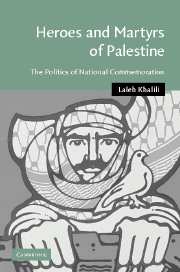Book contents
- Frontmatter
- Contents
- Acknowledgments
- List of abbreviations
- 1 Introduction
- 2 Transnational movements and discourses
- 3 Palestinian lives and local institutions in the camps of Lebanon
- 4 Forms of commemoration
- 5 Contents of commemoration: narratives of heroism, suffering, and sumud
- 6 Guerrillas and martyrs: the evolution of national “heroes”
- 7 Between battles and massacres: commemorating violent events
- 8 Commemoration in the Occupied Palestinian Territories
- 9 Conclusions
- Bibliography
- Index
- Cambridge Middle East Studies 27
3 - Palestinian lives and local institutions in the camps of Lebanon
Published online by Cambridge University Press: 22 September 2009
- Frontmatter
- Contents
- Acknowledgments
- List of abbreviations
- 1 Introduction
- 2 Transnational movements and discourses
- 3 Palestinian lives and local institutions in the camps of Lebanon
- 4 Forms of commemoration
- 5 Contents of commemoration: narratives of heroism, suffering, and sumud
- 6 Guerrillas and martyrs: the evolution of national “heroes”
- 7 Between battles and massacres: commemorating violent events
- 8 Commemoration in the Occupied Palestinian Territories
- 9 Conclusions
- Bibliography
- Index
- Cambridge Middle East Studies 27
Summary
Beirut is our tent
Beirut is our star
Mahmud Darwish, “Beirut”Transformations in transnational discourses, outlined in the previous chapter, were accompanied with local political changes that crucially provided the indigenous terrain for appropriation of transnational discourses. Local institutions – whether nationalist political parties or humanitarian and human rights NGOs – became the conduits for these discourses, but they did not leave them unchanged. While Palestinian refugees in Lebanon have been restricted by the severely circumscribed borders of their camps and by the repressive control of the Lebanese state, nevertheless, world events and regional conflicts have profoundly influenced their lives, and their political contention in turn has been incisive in shaping the broader contours of Palestinian nationalism and political developments in the region.
To understand the politics of Palestinian nationalist commemoration, one has to look at the confluence between these transnational discourses and local political institutions, and to best understand the latter, a brief study of the historical background of Palestinian refugees' presence in Lebanon is necessary. Palestinian history in Lebanon is punctuated by the transformative events which led to the refugees reorganizing their social relations within the camps, choosing new modes of political mobilization, or articulating their demands for political participation in new ways. The exile from Palestine has been an originary cause of all subsequent conflicts in which they have found themselves.
- Type
- Chapter
- Information
- Heroes and Martyrs of PalestineThe Politics of National Commemoration, pp. 41 - 64Publisher: Cambridge University PressPrint publication year: 2007



